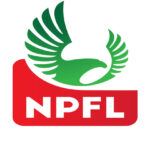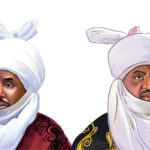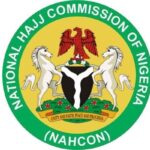Nigerians will be going to the polls today to elect the country’s next president for the next four years.
They will also be electing members of the 10th National Assembly who will be representing their senatorial districts and federal constituencies.
Ahead of today’s election, which is the seventh electoral cycle since 1999, the Independent National Electoral Commission (INEC) revealed that 87, 209,007 out of the 93, 469,008 registered voters have collected their Permanent Voters Cards (PVCs) and are expected to cast their ballots.
The commission had also confirmed receiving cash from the Central Bank of Nigeria (CBN) for election logistics, thereby dousing fears over its inability to access funds due to the cashless policy introduced by the apex bank.
NILDS deploys 369 observers for elections
LIVE: Nigerians elect new Leaders
Daily Trust Saturday reports that INEC had lifted the ban on presidential campaigns on September 28, 2022, with the 18 participating political parties traversing the length and breadth of the country to market their candidates to Nigerians.
Out of the lot, four are seen as frontrunners: the ruling All Progressives Congress (APC), the Peoples Democratic Party (PDP), Labour Party (LP) and New Nigeria Peoples Party (NNPP).
Their standard-bearers, Bola Ahmed Tinubu (APC), Atiku Abubakar (PDP), Peter Obi (LP), and Rabiu Musa Kwankwaso (NNPP), among others, had within the period of the campaigns, toured the states in the country, including Abuja, to sell their programmes.
While Tinubu is running on the mantra of continuity as the candidate of the party in power, Atiku, a former vice president, is asking for another chance to right the wrongs of the APC in the eight years it was in office.
On the other hand, Obi, who prides himself as the face of a new Nigeria, promises a radical departure from the years of transactional leadership, which he said the APC and PDP had manifested in their poor management of the country.
On his part, Senator Kwankwaso had unveiled his 152-page document titled, “My Pledges to You,” promising to listen more and allow Nigerians to dictate the tune of his administration.
To emerge as president, one of the frontline candidates must receive a majority of the votes cast and at least 25 per cent of votes from 24 of the 36 states and the Federal Capital Territory (FCT).
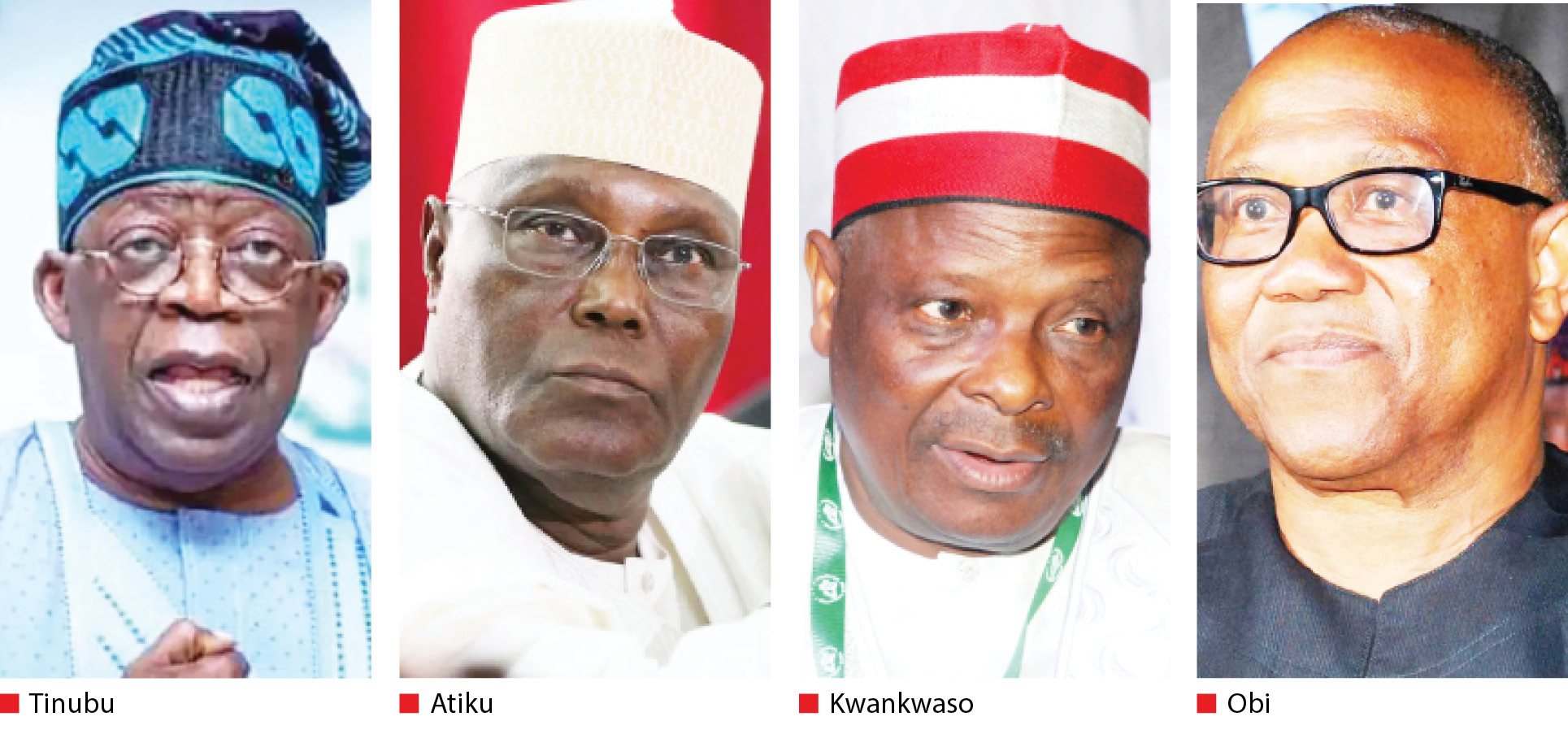
INÉC will declare results speedily – Yakubu
The INEC chairman, Prof Mahmood Yakubu, has assured that today’s presidential and National Assembly elections would be concluded and a winner declared as quickly as possible.
He said this on Friday in Abuja at the second press briefing on preparations for the 2023 general elections at the national collation centre situated at the International Conference Centre (ICC), Abuja.
Daily Trust Saturday reports in the previous election circles, presidential results and winner were formally declared after two days of the elections.
Assuring that the commission will speed up the process this year, Yakubu said, “We will ensure that result declaration will be done speedily. I can’t put a finger on the number of days or hours it will take, but it will be done speedily. We are aware of the anxiety and the need for us to conclude the process quickly, it will be concluded quickly.”
Yakubu also assured that the process will not suffer any encumbrance due to the recent cash crunch triggered by the recent naira redesign policy of the CBN.
“It is not all our operations that are paid for by cash. In fact, the bulk of our procurement for both goods and services is done electronically, but we need a small amount of money to pay for the unbanked that render critical services, particularly at the local level,” he said.
While expressing satisfaction with the progress made on the movement of materials to the various locations around the country, the INEC boss said, “Having deployed these materials to local government areas, we are today devolving the deployment to Registration Area Centres (RACs) so that early morning (today) the polls will open as planned.”
All set for polls
The INEC in the states had confirmed taking delivery of sensitive materials and their distribution to local government areas in readiness for today’s exercise.
In the FCT, there was tight security as materials arrived at the offices of the INEC in area councils for onward distribution.
At the Bwari Area Council, Daily Trust Saturday observed that sensitive materials like BVAS, ballot papers, result sheets among others arrived at the office from the FCT INEC office in the early hours of Friday.
The chairmen of the various political parties were on ground to monitor the distributions of the materials. Daily Trust Saturday reports that generators, mats, chairs, tables were among non-sensitive materials being distributed at the office.
Party representatives who spoke with our reporter commended the transparency with which the materials are being distributed.
The resident electoral commissioner (REC) in Lagos State, Olusegun Agbaje, told newsmen at the CBN office in Lagos on Wednesday that the commission had taken delivery of the materials and commenced their distribution to the 20 local government areas of the state.
Agbaje said that the electoral officers from each council would do the final distribution on Election Day.
Similarly, INEC in Rivers, Benue, Niger, Borno, Nasarawa, Plateau, Delta, Kaduna, among other states had confirmed the distribution of sensitive materials to local government area as at Wednesday.
Security deployment
Daily Trust Saturday reports that there was the deployment of security personnel in the states ahead of today’s polls.
The Inspector-General of Police Usman Alkali Baba said a total of 425,106 joint security operatives were being deployed for today’s polls across the country.
The IGP, who spoke yesterday at the second media briefing by INEC at the national collation centre situated in the International Conference Centre (ICC), Abuja, explained that the figure excludes members of the Armed Forces of Nigeria.
He said the personnel were drawn from the Nigeria Police Force, Nigeria Security and Civil Defence Corps (NSCDC), Federal Road Safety Commission (FRSC), National Drug Law Enforcement Agency (NDLEA), Nigerian Correctional Service, Economic and Financial Crimes Commission (EFCC) and the Nigeria Immigration Service.
The police boss also said the orderlies attached to the Very Important Personalities (VIPs), and some politicians would be withdrawn during the polls. He said the Force expected the VIPs to also drop their armed bodyguards or orderlies from escorting them to the polling booths.
“If escorted to the polling units, the orderlies of VIPs should stay at a distance for their bosses to cast their votes before being escorted away. Just like in any other election, we expect our VIPs to drop their bodyguards/orderlies that are armed in escorting them to the polling stations,” he said.
IGP Baba also noted that activities of terrorists, bandits and members of the proscribed Indigenous People of Biafra (IPOB) and its armed wing, the Eastern Security Network (ESN), remained a challenge.
He also identified what he termed as “anti-democratic conduct of state governors” as one of the challenges faced by the Force in the build-up to the elections.
“Hate speeches, political intolerance, extremism, as well as anti-democratic conducts of some of the state governors and other strategic political actors remain a challenge,” Baba said.
Similarly, the IGP deployed three commissioners of police and three deputy commissioners of police to Akwa Ibom State for the elections today (Saturday).They are to be in charge of the command, the North West and North East senatorial districts of the state.
In Kaduna State, the commissioner of police, Sunday Babaji, said over 16,000 police personnel would be deployed on Election Day to provide security across the state.
The policemen, he said, would be assisted by other sister agencies like Civil Defence, Immigration, Army, Navy and Customs, among others.
On the areas under serious security threats, he said Armoured Personal Carrier vehicles and special police force had been deployed to ensure the safety of the electorate.
Also, one Deputy Inspector General (DIG), an Assistant Inspector General of Police (AIG), two Commissioners of Police and about 5,000 personnel were deployed to Bayelsa State for Saturday’s election.
The Assistant Inspector General of Police in charge of election duty in the state, Amaechi Elemulu, who disclosed this during the election briefing for officers of the command, said the police would maintain a high level of neutrality before and during the poll.
He said, “Close to 5,000 officers and men have been deployed for this election in Bayelsa State, and they are ready for the task.”
EU, UN condemn violence, hate speech
The EU yesterday condemned the recent acts of severe and coordinated incidents of violence in the country.
In a statement, the EU EOM chief observer, Barry Andrews made particular reference to the recent assassination, and urged authorities to hold those responsible to account.
He called on all electoral stakeholders to engage in a manner that reflects the spirit of the peace
Accord signed on February 22, on Election Day and in the days that follow as votes are counted and tabulated and results are announced.
“Furthermore, we urge security agencies to fulfil their responsibilities and ensure an enabling environment for peaceful elections,” he said.
Similarly, the UN Under-Secretary-General and Special Adviser on the Prevention of Genocide, Alice Wairimu Nderitu, said that the election season in Nigeria had witnessed a surge in the use of inflammatory language and hateful and divisive rhetoric.
Such hate speech was amplified at an unprecedented rate by digital technology, she said at a press briefing held on February 24 at the UN House in Abuja.
She warned that hate speech, especially if accompanied by policies and practices that discriminate against populations based on their identity often results in hate crimes, discrimination and violence, and can be both a precursor and a trigger of atrocity crimes, in particular genocide.
“We know that the impact of hate speech makes those targeted more vulnerable to violence, exposes them to exclusion and discrimination, exacerbates underlying social and economic inequalities, and undermines social cohesion,” Nderitu said.
Fidelis Mac-Leva, Abbas Jimoh, Joshua Odeyemi (Abuja), Iniabasi Umo (Uyo), Bassey Willie (Yenegoa), Victor Edozie (Port Harcourt), Hope Abah Emmanuel (Makurdi) & Mohammed Ibrahim Yaba (Kaduna)
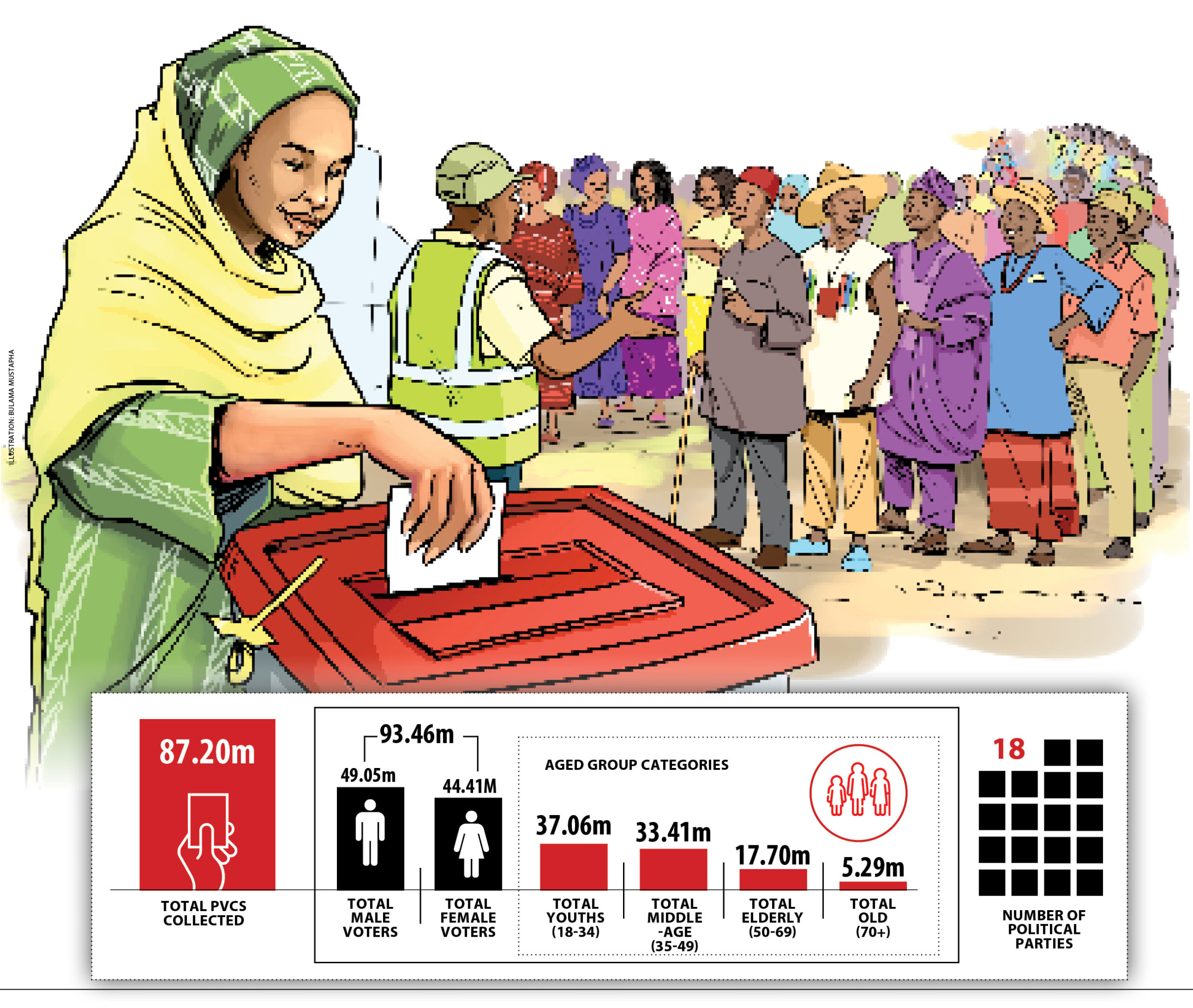
 Join Daily Trust WhatsApp Community For Quick Access To News and Happenings Around You.
Join Daily Trust WhatsApp Community For Quick Access To News and Happenings Around You.